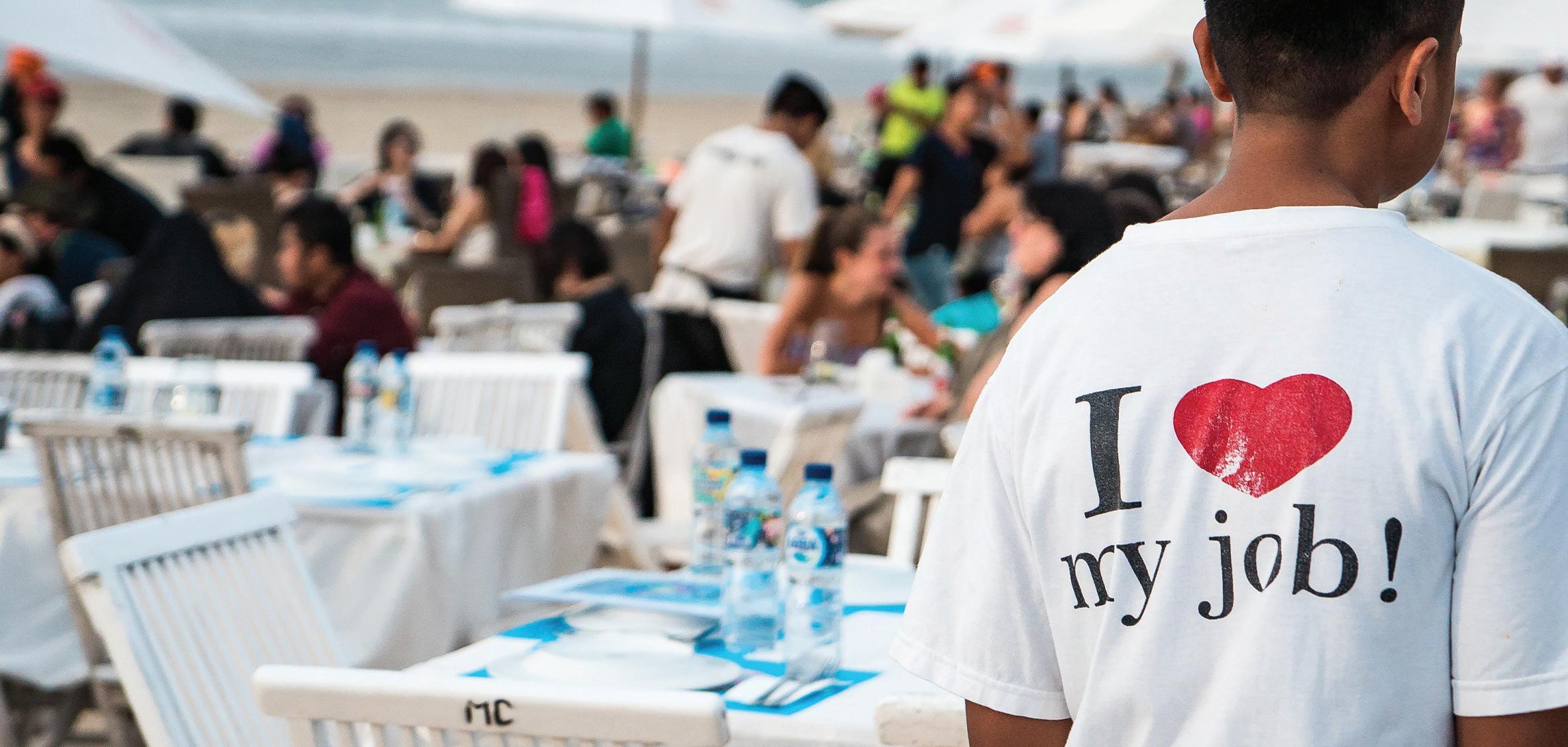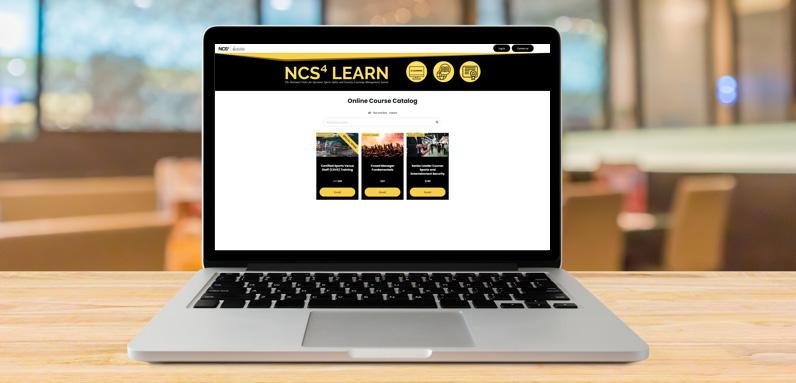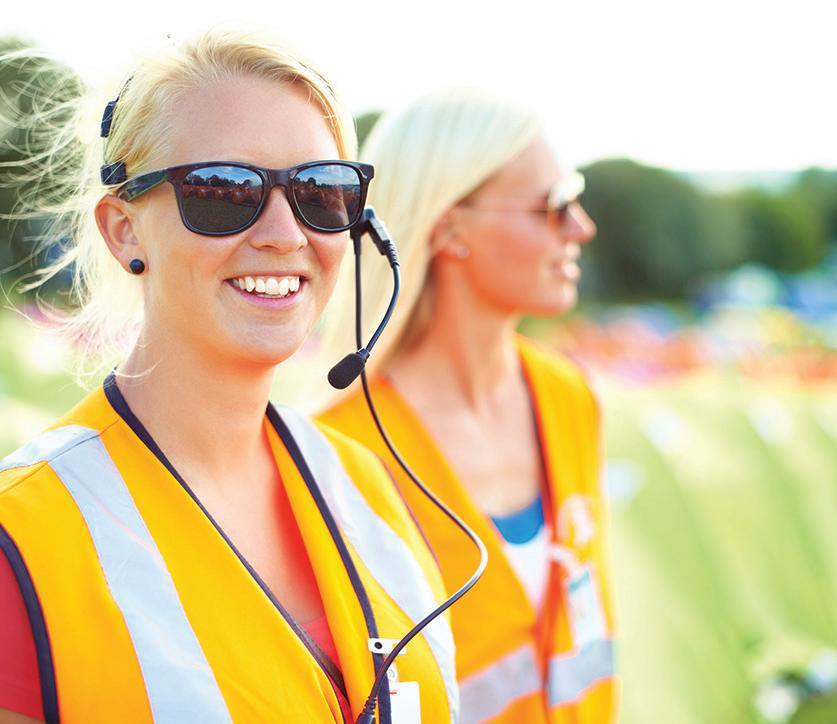
12 minute read
STAFF SUPPORT
from NCS⁴ Gameday Security Magazine - Summer 2022
by National Center for Spectator Sports Safety and Security (NCS4)
The pandemic changed the event management landscape, and now operators are implementing lessons learned when it comes to hiring, training and retaining staff.
By Michael Popke
THE CHALLENGES OF THE PAST TWO YEARS — developing new strategies to attract employees from a shallow labor pool, enforcing mask mandates, implementing vaccine-verification practices — have tested the fortitude of event management professionals and their teams. And while the worst might be over, the lessons learned during this unprecedented period are just starting to pave the way for better operations.
“Everybody’s looking for new ways to improve,” says Jessica Reid-Bateman, director of guest experience for the SAP Center at San Jose, home of the National Hockey League’s San Jose Sharks. “The pandemic taught us that we have to be more resilient.”
Resiliency can take numerous forms. The SAP Center at San Jose, for example, shifted its hiring emphasis from job fairs to advertising for ushers and other event staff via social media, in-game announcements, electronic signage, and good old-fashioned word of mouth from existing employees. Applicants are asked to participate in a video screening process during which they answer five questions. Those making it past that round are quickly scheduled for an in-person interview.
“We can’t wait weeks to respond to a job candidate now,” Reid-Bateman says. “The days of having a hiring fair and seeing 500 people show up aren’t here anymore. The workforce today is much more diverse in how they look for jobs — and what they look for in jobs.” Indeed, engagement is critical to employee satisfaction, according to Drew Pittman, associate athletics director for event management and facilities at Baylor University. Most of Baylor’s event workers are managed by a third party, but that doesn’t mean they’re not part of the university’s staffing family. “When we do a promotion where we put T-shirts on all the seats, we set aside an appropriate number of those shirts for the staff working that game,” Pittman says. “We also were able to bring employee parking closer to the stadium for football games, so they don’t have to get on a shuttle
NCS4 ANNUAL CONFERENCE ALERT!

The conference includes several sessions on staffing, including building an effective team, staff training and communication.
bus anymore. Parking can set the stage for how your day is going to go. It’s the first impression we make with our guests, and it’s the first impression we make with our staff.” Pre-pandemic, event management officials at Duke University would host a “supervisors’ night” prior to the first home football game to review responsibilities and gameday protocol. That preseason gathering is now more vital than ever.
“This past year, we extended invites to more entities than before in order to get everybody in the same room,” says Becca Wilusz, assistant director of athletics for game operations, championships and events for Duke Athletics, who estimates 80 in-house and third-party supervisors from entities as diverse as disability management and parking attended. “We did tabletop exercises so they could meet each other, talk and learn from each other. One of the big things the pandemic robbed from everyone was the ability to not only sustain relationships but to also create new relationships. And when you’re talking about all these new staff members — and potentially lots of new supervisors — creating opportunities to build relationships is so important. If we could build those, then we could be successful and get better and better each week.”
WORKING WITH THIRD PARTIES
Unlike some other colleges and universities, Baylor uses a single third-party company for event management staff rather than multiple companies. But Pittman, who oversees a staff of 11 in-house employees, explains that the university takes a hands-on role in training individuals brought onboard by Rhino Sports & Entertainment Services, a Winston-Salem, N.C.-based company with an office in Waco, Texas, where Baylor is located. “We’re not the ones doing the recruiting and interviewing and hiring, but we’re an active participant with them in trying to strategize about the type of employees we’re looking to hire, the type of training we want them to have, and the goals we want our employees to accomplish,” he says.
Baylor also works with Rhino to set pay rates, which in turn allows the university to be flexible based on what the market dictates. The university also covers training costs for outsourced third-party employees, something Pittman says is more common now than it was, say, five years ago. “We have some fairly high expectations for both the guest experience aspect and the safety aspect,” he says, citing the importance of consistency in training to ensure all event staff members are on the same page.
“We attend Rhino training sessions, and we try to get to know everybody and put a name with a face,” he says. “With 11 staff members and upwards of 400 employees at a football game, sometimes that’s tough. But I guarantee our staff working basketball games can identify every one of the 80 or 100 employees, because they spend time around them and ask them questions. Hey, how are your kids doing? How’s Grandma and Grandpa? That seems to be what people appreciate the most.”
National Emergency Response and Recovery Training Center

DHS/FEMA Approved Training Workshops
SPORT EVENT RISK MANAGEMENT AWR-167 Building capabilities for multi-agency collaboration, intact teams are immersed in a collaborative environment incorporating basic concepts relative to planning, risk assessment, training, exercising plans, and recovery/ business continuity through scenario-based training modules.
SPORT AND SPECIAL EVENT INCIDENT MANAGEMENT MGT-404 Develops athletic department staffs, facility management personnel, campus public safety personnel, emergency response supervisors, and others involved in sports and special event management to better prepare for, manage and recover from incidents that could occur during a sporting event or other special event.
SPORT VENUE EVACUATION AND PROTECTIVE ACTIONS MGT-412 Prepares venue operators, first responders, emergency managers, law enforcement, contractors, promoters and owners to effectively collaborate on evacuation and protective action decision-making. The course provides flexible and scalable protective measures for planning, evacuation and sheltering.
SPORT AND SPECIAL EVENT ENHANCED INCIDENT MANAGEMENT MGT-440 Prepares emergency responders, as well as event management personnel, concessionaires, athletic department personnel and chief executives who would be involved in the preparation for and response to a large-scale incident during sporting or special events.
ENHANCED SPORT AND SPECIAL EVENT RISK MANAGEMENT AND ASSESSMENT MGT-466 Provides participants with tools and methodologies for conducting venue and event-specific risk assessments. In this course, participants will analyze risk and utilize assessment outputs to determine risk mitigation options and their effectiveness.
SPORT AND SPECIAL EVENT PUBLIC INFORMATION AND EMERGENCY NOTIFICATION MGT-467 Prepares participants to identify and navigate the sport and special event communication landscape before, during and after an incident. This interdisciplinary course brings planners, operators, communication, government, public safety, marketing and public relations professionals together to prepare and/or enhance venue and event communication programs.
NEW! CROWD MANAGEMENT FOR SPORT AND SPECIAL EVENTS MGT-475 Introduces public safety officials, venue operators, event planners and community stakeholders to key concepts and considerations for crowd management, control and dynamics. The course content is scalable and applicable to all sports and special events regardless of venue size, capacity or type of event.
NCS4.USM.EDU/TRAINING
For more information about hosting or attending, contact the NCS4 Training Department at: NCS4Train@usm.edu

All that effort is paying off. Several Rhino employees who work Baylor football games traveled from Waco to New Orleans for the 2022 Allstate Sugar Bowl at the Caesars Superdome, where the Bears defeated Ole Miss, 21-7.
“It’s definitely a situation where you’re going to get out what you put into it,” Pittman says about establishing strong employee engagement. “The more you invest with [your events team] — even if it’s just as simple as learning and remembering their names — the more dividends you’re going to reap.” NHL’s St. Louis Blues in 1998 at what was then the Kiel Center (now the Enterprise Center).

TRAINING FOR THE LONG HAUL
In the wake of the pandemic, investing with staff members and making them feel comfortable in their positions was a top priority when venues began welcoming back guests. The SAP Center at San Jose uses a combination of in-house employees and thirdparty partners to staff events, and all of them were forced to adapt to a changed world.
“Normally, we’re dealing with a guest concern because somebody might be sitting in their seat, or they accidentally spilled their soda,” Reid-Bateman says, noting that such COVID-19 protocols as facemask requirements and proof of vaccination were in place at the arena from September 2020 “I jokingly tell people that I’m always amazed I made it past the third event, because I felt woefully unprepared,” she says. “So when I became a manager, one of my responsibilities was new-hire training, and I said I was never going to let what happened to me happen to somebody else. We’re not expecting anybody to come in the door and have 10 years of ushering experience, but we are expecting folks to have an understanding of how to solve a problem — even if the answer is just getting help from somebody else. As long as somebody is understanding the concepts of what our positions hold, we can teach them the skills of how to de-escalate. We can teach them how to read a ticket and how to do a seat relocation.”
JESSICA REID-BATEMAN
to April 2021. “Having to explain to a guest that they’re not fully vaccinated was a new challenge, and I think the team really stepped up in amazing ways, considering that we — like everybody else — lost a lot of our institutional knowledge.” While fans who responded negatively to COVID-19-related safety measures were referred to team leaders when a situation escalated, Reid-Bateman says frontline employees had to learn a new set of skills that three years ago were unimaginable. “We’re working very hard now to make sure that, if something else were to occur in the future, we don’t have that institutional knowledge gap,” she says. “We’re diversifying our training and making sure that we have multiple team members who are versed in different parts of our operation.”
Reid-Bateman especially enjoys hiring high school students as ushers. Usually, it’s their first paid position, and they’re enthusiastic learners. Her first job also was as an usher, for the Reid-Bateman also hopes to roll out a career mapping strategy this fall that will help new and existing team members better understand not only their current position, but also give them a sense of belonging and provide a transparent view of the skills and attributes required to advance within the organization.
“I truly believe that if people know what’s expected of them, they can exceed those expectations,” she says.
RE-EVALUATING “ESSENTIAL”
The event management staff at Duke University struggled with pandemic-related challenges, too, which were complicated by the fact that five of the seven in-house team members were new hires for the 2021-22 academic year. Their baptism by fire included Head Basketball Coach Mike Krzyzewski’s 42nd and final season coaching in the cozy confines of 82-yearold Cameron Indoor Stadium, where Wilusz says the strictest of COVID-19 protocols were in place.
Her team implemented on-site testing for fans who either didn’t provide proof of vaccination or didn’t get tested prior to arrival. With fans paying tens of thousands of dollars for regular-season tickets, “we had to give people every possible option to get into
the stadium,” she says, adding that despite the university’s proactive approach to mitigation, her team experienced staff shortages.
“Even veteran staff members weren’t comfortable yet coming back and being around large crowds, or they couldn’t risk potential exposure to COVID-19 because they had higher risk individuals at home,” she says. “Plus, we were still masking [at outdoor events] during the fall 2021 semester, and there were staff who didn’t agree with masking. So they did not come back to work.” Wilusz and her event management team took the term “essential employees” to heart and considered ways to adjust staffing numbers while still maintaining safety and security standards. “For us, operating for an entire year without fans and just essential personnel in the venue was a true lesson in what ‘essential’ really is,” she says. “Can we run a soccer game with seven people instead of 14? There are lots of lessons from the pandemic, and one of them is that we can eliminate some of the fluff that has been built in over time and ask ourselves what we truly need. How do we more appropriately scale staffing based on attendance in our venues?” That doesn’t mean Duke’s staffing shortage has been completely eradicated. Even with thirdparty partners, finding the staff to work football games became a headache last fall, especially considering teams from three major Atlantic Coast Conference schools (Duke, North Carolina State University and the University of North Carolina) are located within a 30-mile radius of each other. Some Saturdays, all three universities hosted home football games.
Wilusz also continually makes working Duke Athletics events an even more desirable gig. Recognition and rewards programs, frequent personal interactions, and creating a sense of
NCS4 LAUNCHES NEW E-LEARNING PLATFORM

The NCS4 has launched a new eLearning platform, NCS4 LEARN, which provides opportunities for individuals and organizations to access asynchronous professional development opportunities. Current offerings include:
• Certified Sports Venue Staff (CSVS) Training • Crowd Manager Fundamentals • Senior Leader Course: Sports and Entertainment Security
Please visit the website or contact us at NCS4Learn@usm.edu if you have any questions or would like to inquire about bulk registration.


belonging go a long way toward accomplishing that mission. But she and her management team recently took things a step further and requested feedback from supervisors and staff about what else they need to be successful on gamedays.
BECCA WILUSZ
“We provide all of these resources, like a staff information book, but when we asked if it was useful to them, they told us it’s too big and clunky; it’s too hard to find information quickly,” Wilusz says. “So we completely redid a lot of our staff resources and highlighted the most important five to seven things they need to know.” The goal was to help make a job that can leave some employees feeling anxious a little less overwhelming. “We know the most common questions they get: Where are the nearest restrooms? Which way do I go if there’s a stadium evacuation? Where do I catch the gameday shuttles? Rather than have all that information buried in a big book, it’s on the back of a card attached to a lanyard around their neck so they can easily read it. We’re trying to make life easier for them by improving their experience, so that their interactions can be as positive as possible.” l






